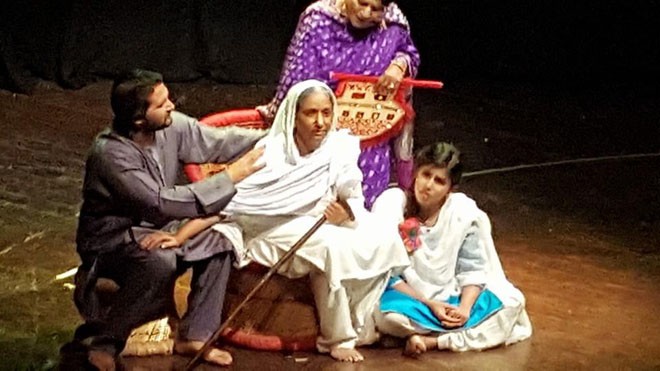
Ajoka Theatre’s recent play focuses on the tragic impact of the partition of the subcontinent

The latest production by Ajoka, Anhi Mai Da Sufna staged at the Alhamra last week was actually based on two dreams of two individuals who had suffered on account of partition. It was a statement in mock happiness when the wish was not fulfilled but assumed to have been fulfilled.
But both were treated very differently for no apparent reason. One visit was in the dream by Rangu Rang-saaz from Shah Alam who was actually Dharam Das but had to change it to a Muslim name, a very reputed dyer popular with the women clients of the area. His dilemma was that he could not decide in the either/ or conundrum between his family and his place of birth. The family left while he stayed back but after decades of living here he received an invitation to attend the wedding ceremony of his granddaughter on the Indian side of the Punjab.
Obviously, he had problems in getting the visa because his name had been changed to a Muslim one and the invitation that he had received was in his original name which was Hindu. He attended the marriage ceremony of his granddaughter in his dream and was thus shown as being satisfied and happy.
While Mai Janki who was old and blind, wanted to visit her village Prem Nagar where she grew up and to be with her childhood friends. She was also not able to get a visa because she had no relative on the Pakistani side of the border to send her a formal invitation in writing. So to placate her, the family decides to take her on a mock visit to Pakistan since she was blind and they thought she would not know that it was not a real visit. They pretended that they had taken her to Pakistan by going through the motions of travel where she was carried on a charpoy and taken through the charade and bizarre ritual staged at the Wagha Border. Her mock visit with themes of love and fulfillment paralleled the enactment of the mock battle on the border between the two warring countries.
Once she was told that her childhood friend Zulaikha had died she insisted on being taken to her grave. On a mock grave, she confessed to being partly responsible for the murder of Zulaikha’s paramour Yousaf because she had been jealous as she was also attracted to him. It seemed that she had been carrying that guilt all her life and wanted expiation at some point. Her expiation thus was a mock expiation on a mock grave of a friend grievously harmed.
The mock visits were exercised in black and macabre humour with the ironic undercurrent more than obvious. But it was not made clear as to why in the case of the man the longing was only about members of the family who had migrated while he had not, but in the case of the woman it also involved an element of guilt. It could be that more than one aspect of the human dimension was being intended to be put on show.
To be guilty and to be wanting expiation has an archetypal ring to it. In mythology, it had often been narrated how on the spur of passion or even premeditated design, an act is committed, and the rest of life is spent in shedding tears of repentance and the urge for expiation which does not happen. The Punjabis went on a rampage of decimating their own kin despite the much touted commonality of culture and language. They have not been able to overcome this madness where they were the most to blame.
The tragic impact of partition perhaps could have been conveyed with full intensity if the play had a more realistic flavour, and the anguish and longing of characters had been built upon rather than going through some kind of a catharsis through dreams. The dimensions of migration, resettlement and subsequent issues of rehabilitation are probably too huge to be treated in a short play and need a formal structure that has epic proportions. It could also be that the play was a note of resignation that the state of affairs between the two countries would stay as they are, taut and irreconcilable, the only satisfaction derived could be in dream and not in reality.
The music and singing and dancing which have become the signature features of an Ajoka production helped in mitigating the tragedy rather than intensifying it. It was handled more in a tragicomic manner .The major role of Janki Bai was played by Samina Butt while that of Rangu Rang-saaz by Arshad Durrani. The others in the cast were Usman Raaj, Qaiser Khan, Sohail Tariq, Razia Malik, Nayab Faiza, Anam Zaheer, Shahzad Sadiq, Amir Sahotra and Bilal Mughal. The singers included Kamran Khokhar, Naeem Ijaz Adnan John, Javed Sarfaraz and Christina Pervaiz, while some of the compositions were based on standard folk tunes -- some were new and composed for the play.
Written by Shahid Nadeem and directed by Usha Ganguli, it was a usual Ajoka production with prancing and yards upon yards of cloth waving, which served both as prop and set. Usha Ganguli is not unfamiliar to theatre audiences in Pakistan. In her note in the brochure, she emphasised the movement and other non-verbal responses being very similar to the actors and performers on both sides of the border. This should be seen as a strong desire to work together and build on the particularities of the various forms of art that flow into the bigger river of the multidisciplinary theatre.